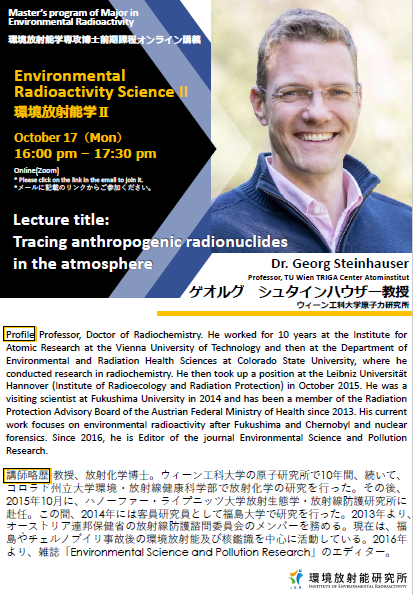October 17, 2022, we held an IER Special Seminar online <Dr. STEINHAUSER>
Date & Time
Mon. Oct 17, 2022, 16:00 ‒ 17:30 JST
Venue
Online (Zoom)
Guest Lecturer
Dr. Georg Steinhauser, Professor, TU Wien TRIGA Center Atominstitut
Title
Tracing anthropogenic radionuclides in the atmosphere

In some of the classes of the Master’s Program of Major in Environmental Radioactivity, distinguished external researchers are invited as guest lecturers, and their classes are open to other faculty members on campus as “Special Seminars”.
On October 17, the online lecture on the subject “Class Subject: Environmental Radioactivity Science II” by Prof. Georg Steinhauser gathered more than 40 attendees including five IER graduate school master students, PhD students, IER members, and students and researchers from other departments at Fukushima University. In this lecture, Prof. Steinhauser talked about global monitoring of anthropogenic radionuclides in the atmosphere as a tool for tracing the nuclear incidents in various parts of the world (such as the Chernobyl accident, which was only disclosed by the Soviets after the discovery of atmospheric release detected in Sweden), and about advances in nuclear forensics based on the example of the investigation of an undeclared release of 106Ru into the atmosphere detected by the European monitoring stations network in 2017. Prof. Steinhauser explained how the concentration ratios of radioactive and stable ruthenium isotopes and their chemical species composition in the release made it possible to identify the plausible source of the release (estimated as Mayak, Russia) and understand the event scenario. During the Q and A session, lecture participants discussed the prospects for further development of a monitoring network to detect local and global nuclear events, the use of airborne surveys to trace atmospheric releases, accidents of satellite nuclear facilities in the atmosphere, the need to account for chemical forms of the airborne radionuclides, such as organic and inorganic iodine, and the need for open information and international cooperation in investigating radioactive releases.
